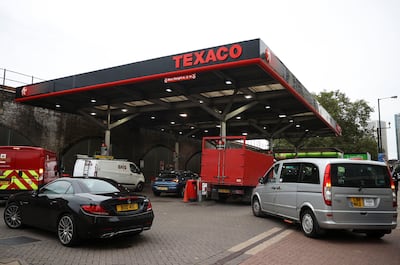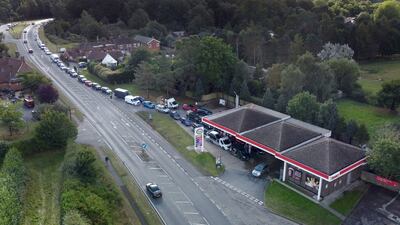The number of petrol stations closed because of fuel shortages has halved in the space of four days in tentative signs the crisis is easing, a government minister has said.
Chief Secretary to the Treasury Simon Clarke said the situation is “moving in the right direction” a week after the crisis was sparked by the leaking of a confidential document.
He said there were little more than a quarter of sites empty of fuel on Wednesday, down from 60 per cent over the weekend.
However, many stations across the country were empty on Thursday morning as they awaited their next fuel delivery after running dry.
Drivers continued to queue to fill up their tanks at stations that had fuel after days of panic buying.
Mr Clarke was pressed on the government’s muddled response to the crisis after ministers had planned to use soldiers to drive tankers before taking a step back from the plan.
He said military personnel were “on standby” and would be called upon if needed.
He also said fuel deliveries were on the increase, after Business Secretary Kwasi Kwarteng’s announcement that 80 government-owned tanks had been used.
“We’re in a situation now where there is more fuel being delivered to petrol stations than is being sold, which is great,” Mr Clark told BBC Radio 4’s Today programme.
“The army is on standby to help support the commercial operations and, of course, we’ve seen some changes, including, notably, allowing some MoD driving instructors to help boost the number of tankers,” he said.
“There’re 150 drivers on standby to help support operations as required.
“This is designed to help buttress the commercial operation, which is driving down the pressures that we’ve seen on forecourts.
“We are confident that things will normalise really quickly if we can just avoid the panic buying, which has exacerbated the situation very severely,” he said.
He refuted the claim that Brexit has led to shortages of qualified HGV drivers in the UK.

He said any claim that Brexit is to blame is an attempt to revert to a “negative conversation about opportunities foregone”.
He pointed out that the EU countries are also experiencing shortages of lorry drivers.
Speaking to Sky News, he said the panic buying must stop and offered hope to drivers with the latest figures.
“We are in a situation where the data is clearer on this, over the weekend 60 per cent of petrol stations were out of fuel – that was down to 27 pe rcent as of yesterday [so] the numbers are really moving in the right direction,” he said.
The government-owned fuel tankers were due to be on the roads by Wednesday afternoon to restock pumps that had run dry.
“The trucks are driven by civilians and will provide additional logistical capacity to the fuel industry,” Mr Kwarteng said.
His announcement came as the Petrol Retailers Association said that about 27 per cent of its members’ sites had run dry on Wednesday.
This figure was down from 37 per cent on Tuesday and the estimated 50 per cent to 90 per cent of stations on Sunday and Monday.
The body represents the independent retailers that make up about two thirds of the UK’s 8,000 petrol stations.











